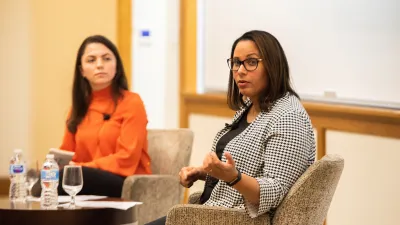
Campbell's Emily Waldorf Speaks at Lunch, Learn and Lead
VP of Strategy for Campbell Soup Company Emily Waldorf, is tired of people telling professionals – especially women - that the way to get ahead is to simply, “lean in.” For Waldorf, the future of your career relies most on your work ethic, skillset and a little self-assessment.
Speaking to a group of students, faculty and staff at the Lunch, Learn and Lead luncheon on April 10, Waldorf shared how strategy not only helped her transform the businesses she’s worked with but also her career.
A graduate of Harvard Business School, Waldorf has held a variety of roles, including serving as the corporate development director at Discovery Communications, director of corporate development at AT&T Corp. and working as a special advisor at the Federal Bureau of Investigation.
“I never really think of career as a straight path,” said Waldorf. “People think if they never get a promotion that’s a failure but I’ve never felt that way. I’ve always thought, ‘Actually I don’t want to be bored and if I’m going to be out of my house for eight to ten hours a day I want to have a little fun.”
Emily joined Campbell in 2012 as director of corporate development. During her time in that position, she led the company’s largest-ever acquisition, Bolthouse Farms and focused the company as they sold Campbell’s European business. Waldorf moved up quickly at the company, serving as vice president and chief of staff from 2013 to 2014, before moving to her current position as head of corporate strategy.
But with all of Waldorf’s success, she says her advances stem from a willingness to be able to take a step back. “I feel like if you’re waiting for the promotion, you’re staying in a job too long,” says Waldorf. “You should be able to show that you’ve grown through lateral motions and I think that works better for most people. I feel like we don’t always focus on the long-term.”
The former math major signed on to Campbell during an exciting time for the company, able to help lead the way as the company experiments with new strategies and models through their business incubator. “Most companies have a problem with breakthrough innovation because at the end of the day, people have routines and patterns that they like to eat,” says Waldorf.
Campbell’s new incubator is responsible for two new subsidiaries that allow the company to take on new ventures and explore different business models. Based on a buy-one-give-one model, Soulfull was one of the first business to come from the incubator that has the mission of helping to solve local hunger in the area. “What was really unique about what the Soulful team came up with was their business model because they were really inspired,” says Waldorf. Faced with the challenge of building a new company and touched by a woman who visited the office looking for food to feed her family, the team decided a healthy oatmeal that could also be donated to local food banks would be their way of creating a company for the greater good.
Following Soulfull, the incubator also helped create Habit, a personalized food service company. Habit asks customers to sign-up and get a test kit that measures their allergies and sensitivities and from there, allows them to purchase supplements and meal plans that work best with their genetics. Habit – though backed by Campbell – functions like a startup. It is 80 percent owned by Campbell instead of 100 percent and the other 20 percent owned by employees – thus works as a venture-backed company. “For us, the most innovative thing about Habit is the business model,”
says Waldorf. “It’s an interesting idea and it’s going to be a horizon three innovation. We’re not allowed to touch it at all we can’t tell them they’re not allowed to structure the food a certain way.”
Campbell’s entrepreneurial spirit falls in line with what Waldorf views as the most important aspect of her trajectory thus far not withholding a great work ethic. “I’ve always been open to trying a lot of different things and finding what works best for me. I think a lot of advice we get – particularly women – a lot of advice we get is behavioral. It’s how you need to behave to get the job. ‘You have to lean in,’ or ‘You have to use your voice and speak up more often,’” says Waldorf. “For me, that’s great advice but not the most important thing. First and foremost, you have to be great at your job. If you don’t perform, it doesn’t matter what your network is.”


